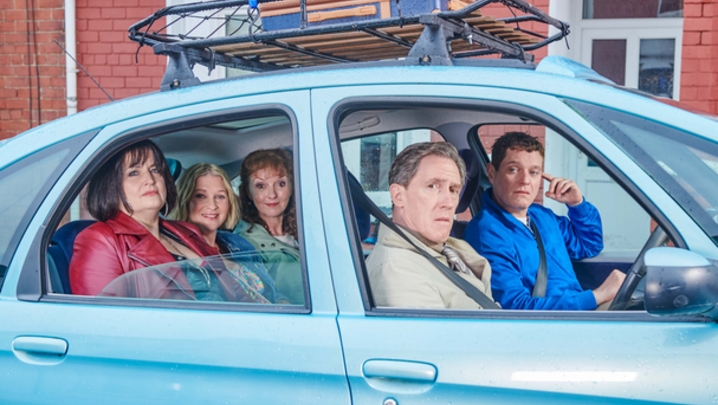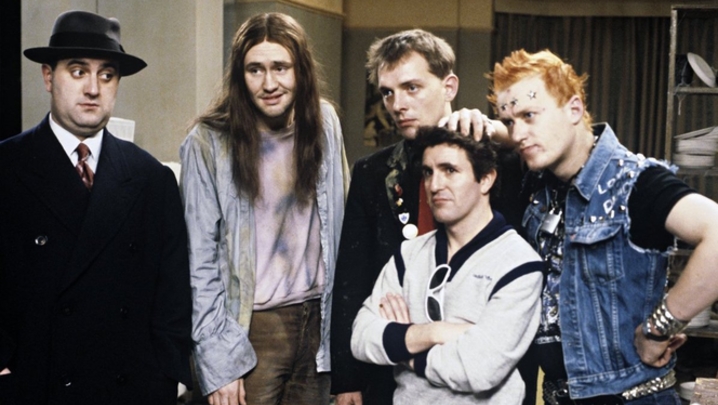Pippa Shawley is underwhelmed by BBC Three’s move online and thinks other millennials will feel the same way
Anyone who tuned in for BBC Three’s final broadcast in the early hours of 16 February might have noticed the youth channel go out with a whimper, not a bang.
Not for BBC Three, any self-congratulatory run-down of the best commissions in its 13-year history. Instead, a repeat of Gavin & Stacey was followed by a trailer for new, online drama Thirteen and it all ended with a test card announcing that the channel had moved.
Perhaps the lack of fanfare was part of the brand’s emphatic declaration that it wasn’t closing, but moving.
Yes, in case you missed the news, BBC Three, the youth-focused brand that brought us Little Britain, Being Human and, er, Danny Dyer: I Believe in UFOs, has left the building and gone to the Cloud.
Where detractors of the move saw declining opportunities for young people to be represented on TV, the channel’s Digital Controller, Damian Kavanagh, promised freedom for audiences and more money for commissioning new-form content.
For those of us who spent our teenage years tuning in to late-night repeats of Two Pints of Lager and a Packet of Crisps after a night on the Bacardi Breezers, the idea of consciously going online to find post-pub viewing seems unlikely.
And perhaps this is why BBC Three has recalibrated, separating its content into two pillars of destination viewing: Makes Me Laugh covers scripted comedy and personality-led entertainment; and Makes Me Think includes drama, current affairs, authored docs and flagship factual.
"It’s no wonder that the number of nightclubs in the UK has halved in the past decade. We’re all staying inside watching Better Call Saul instead."
According to Kavanagh, 80% of BBC Three’s budget will be spent on long-form content, which will eventually make its way onto either BBC One or BBC Two.
The remaining 20% will be spent on multimedia content, ranging from quizzes and listicles to picture galleries and gifs, all hopefully reaching young digital audiences.
Although it’s still early days for BBC Three 2.0, the world appears to have continued turning – despite the demise of the 60 Seconds news updates and ad-free runs of Family Guy (which was poached by ITV2).
For a brand that claims it’s trying to reach young audiences where they hang out, it’s quite an effort to access this hot new digital content.
Instead of simply turning on the TV and flicking to the designated channel, you now have to contend with BBC Three’s seizure-inducing website (hot pink clashing with a bile green background).
And therein lies another problem for BBC Three. Without its linear channel to anchor viewers to its content, it must now directly compete with everything else that’s on the internet, from Netflix and YouTube to its iPlayer stablemates, such as The Great British Bake Off.
While it’s true that young people are watching more content online, it increasingly feels as if there is simply too much online content to keep on top of. It’s exhausting, trying to keep up with Orange Is the New Black, Making a Murderer and Zoella’s latest make-up tutorial, without having to contend with BBC Three’s 10-minute titbits, such as The Ladventures of Thomas Gray.
It’s no wonder that the number of nightclubs in the UK has halved in the past decade. We’re all staying inside watching Better Call Saul, while tweeting our pithy observations, instead.
When it was announced in November that BBC Three’s linear channel was to close, the RTS digital team hit the streets of London to gain public opinion about the news.
The views were mixed, particularly within BBC Three’s target audience of 16- to 34-year-olds. Older people, it seemed, were not concerned about the channel’s closure; many had never watched it, aware of the fact that it “wasn’t for them”.
Younger people tended to fall into one of two camps: those who would miss the ease of flicking over to BBC Three while watching their television; or those who claimed to do most of their viewing online anyway. The latter thought the move would simply compliment their existing habits of flitting between YouTube, Netflix and iPlayer.
Outside of London, a friend in Devon bemoaned the inevitable buffering that she has to contend with when streaming. It’s something that the BBC Trust mentioned in its report on the final decision to move BBC Three online.
The Trust recognised that “no condition can be imposed that will provide this audience with access to the full range of BBC Three content once it transfers online.” The Trust hoped that the Government’s aim to have superfast broadband in 95% of homes and businesses by the end of 2017 would clear up this issue.
Since the linear channel closed, I’ve found my heart sinking every time I hop past ITV2 in the EPG to be met by the same test card telling me that BBC Three has moved online. Before, I might have found Don’t Tell the Bride or Snog, Marry, Avoid to ease me in to my evening’s viewing.
Now, it’s a toss up between The One Show and The Great Interior Design Challenge, both making me inclined to reach for the off button if only I had the will power.
It does not occur to me, yet, that I should fire up iPlayer and check out BBC Three’s latest offerings.
At work, I scroll through its social media accounts. The Twitter feed is full of retweeted praise for documentary series Life and Death Row, which I saw and liked, albeit on BBC One following the Ten O’Clock News.
Another night, I start watching series 3 of Cuckoo, the sitcom starring Greg Davies, Helen Baxendale and Twilight actor Taylor Lautner.
Again, I watch it on BBC One after the news. It occurs to me that at this rate, I will begin to resemble the sort of pale, nocturnal beings that Lautner used to dwell among in the vampire trilogy.
By day three of my new viewing timetable, I have finally accepted that I will have to watch some BBC Three content online. Where I would normally spend my lunchtime catching up on All4 (the office internet seems to cope with its incessant advertising better than my home wi-fi),
I choose Our World War, a dramatised account of the opening days of the First World War. It is harrowing. I hope my colleagues don’t notice me flinch as another limb goes flying across the Belgian mud.
As the week draws to a close, my social life picks up, leaving little time to browse the various on-demand websites at my disposal for something to watch. I’m intrigued to see that BBC Three is live-tweeting reactions to the Brit Awards, which are being shown over on ITV.
Still, Kavanagh did tell Victoria Derbyshire that he wanted to “fish where the fish were”.
At the weekend, an advert for a blog called Find the Girl appears. It’s a tie-in to Thirteen, the new drama about a woman’s escape after 13 years in captivity. Despite the trailer for the show popping up during primetime on BBC One, I’ve yet to tune in.
Perhaps if it was on TV, I’d stumble across it one evening and get hooked. As it is, I add it to my pile of things to catch up on, right after Fresh Meat, Vinyl and Girls.




